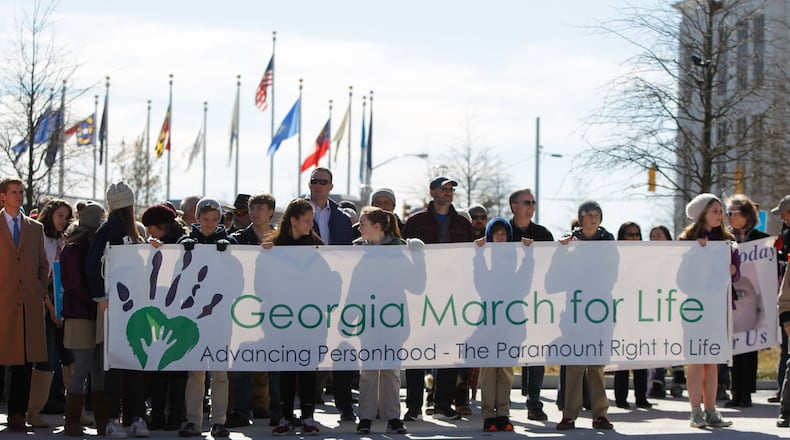It started with a recording of a 12-week-old baby’s heartbeat, the echo of its thumping vibrating through the speakers at Liberty Plaza across from the Capitol as hundreds of anti-abortion advocates met Friday for a memorial service and silent march.
As the recording slowed to a stop, over 200 people marched through the streets of downtown Atlanta, walking hand-in-hand, holding up signs or folding their hands in prayer.
While the Georgia March for Life is an annual event, there was a little more political energy behind this year’s march.
It came a day after the Trump administration announced the creation of a federal health division to protect doctors, nurses and other health specialists who, based on their beliefs, oppose providing medical care such as abortions and sex-change operations.
On Friday, the U.S. House took another big step by passing a bill hours ahead of the March for Life events across the country to obligate doctors to give medical assistance to any fetus born alive during a successful or failed abortion. President Donald Trump praised the House for passing the bill.
Regina Vivanco, a mother of 10 children, all but one of whom attended the march, praised the Trump administration’s role in supporting her cause.
“Trump has been such a blessing for the pro-life movement, and it would be great to see something actually put” into law, she said.
Shannon Vogt, vice president of Georgia Right to Life, called helping to organize the event “one of the greatest privileges of my life.”
“As for the administration’s decision,” Vogt said, “that seems rational and I would be in support of such a legislation.”
The Georgia March for Life keynote speaker was James Merritt, the lead pastor at Cross Pointe Church in Duluth. Merritt said he was in complete support of the Trump administration’s decision to create the new federal division.
“I believe a doctor violates the Hippocratic oath when he performs an abortion,” Merritt said. “Doctors should follow their conscience, beliefs and their freedom to do what’s right.”
While hundreds rallied against abortion, many also voiced opposition to the use of IUDs, birth control and emergency contraception, known as the “morning after pill.”
Tara MacMillan, a student at the University of Georgia and a pro-abortion rights activist, watched Friday’s march. MacMillan said she opposes the Trump administration’s recent actions.
“I believe that sometimes abortion is in the job description for specific doctors or nursing jobs,” she said.
“If your religion is the reason why you don’t want to perform an abortion, don’t be a doctor. Don’t be a nurse,” MacMillan said. “Don’t point your life in the direction of a job which you will be performing an abortion if that’s your point of view.”
Paul Rio, a Georgia State University student who watched the march pass by, said he is a devoted Christian who believes in the importance of following his faith. While Rio said he would try to talk a partner or friend out of having an abortion, he doesn’t think it’s his decision to make for others.
“As a male, I will never be in the position to make the final decision myself,” he said. “I will never have to carry the physical and emotional burden of an unwanted rape or pregnancy.”
Rio said he does not support the administration’s push against abortion.
MacMillan said the March for Life participants are accountable for taking away women’s rights.
“Anti-abortion marches make me uneasy because they are essentially anti-women,” she said. “These people are pro-birth, not pro-life. If a woman doesn’t want to continue the life of a fetus inside of her, that is her choice.”
Never miss a minute of what’s happening in Georgia Politics. Subscribe to PoliticallyGeorgia.com.
About the Author




